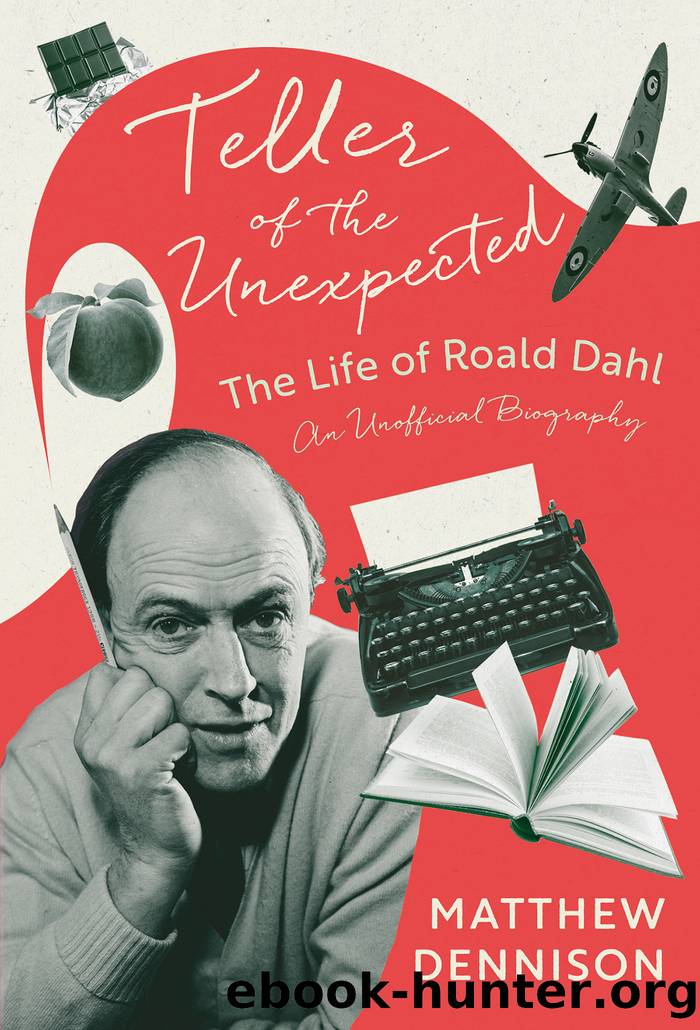Teller of the Unexpected: The Life of Roald Dahl, an Unofficial Biography by Matthew Dennison

Author:Matthew Dennison [Dennison, Matthew]
Language: eng
Format: epub
Tags: Biography & Autobiography, Literary Figures, Historical, History, Europe, Great Britain, 20th Century, Literary Criticism, Children's & Young Adult Literature
ISBN: 9781788549400
Google: s3B8EAAAQBAJ
Publisher: Head Of Zeus
Published: 2022-08-04T20:34:08+00:00
*
Absent parents fill Roaldâs fiction: a mother or father dead, or, like the Wormwoods in Matilda and Billyâs mother in The Minpins, uninterested in their children, or otherwise preoccupied, like the Krankys in Georgeâs Marvellous Medicine and Charlie Bucketâs overworked mother and father, or simply distant, like the mother in a story called âThe Wishâ, âfar away ⦠looking for her sonâ, unaware of his fears and torments.37 Overwhelmingly his heroes and heroines are parentless. âNo one is going to be worrying too much about me,â the orphan Sophie tells the BFG: the statement applies in equal measure to any number of Roaldâs fictional offspring, beginning with Lexington, the âbeautiful baby boyâ born âonce upon a time, in the City of New Yorkâ in a cautionary tale from 1960 called âPigâ.38 It would not be a criticism that, as children, Olivia, Tessa, Theo, Ophelia or Lucy Dahl could level against their father.
In October 1938, Sofie Magdalene had received a letter from a friend travelling, like Roald, on the SS Mantola to Africa. Describing Roald as âvery popular with everyoneâ, she added, âLuckily for him he is fond of children & is good with them, for they swarm all over him.â39 Two decades later, Sofie Magdalene was able to judge for herself something of this observationâs accuracy. Roald was thirty-eight when Pat conceived their first child and immediately excited by the prospect of fatherhood. By contrast, Pat would find she struggled as a mother, at one point handing over year-old Olivia to her sister-in-law Else for a period of several weeks. In her autobiography, she remembered Roald as âa very maternal daddyâ; her career offered lengthy periods of respite from Olivia, then Tessa, who was born two years later.40 Despite a relish for the scatological that peppers his writing, Roald did not enjoy what he labelled newbornsâ âwhirling blur of wet nappies and vomit and milk and belching and fartingâ; he employed and oversaw a sequence of nurses.41 But his letters written at this time reveal his familiarity with these aspects of childcare: more often than not, it was Roald, not Pat, who ministered to the family that, with Theoâs birth in July 1960, had grown to three.
This succession of new babies interrupted Roaldâs writing. In New York, he rented a writing room in an apartment close to the Dahlsâ own; in the garden of Little Whitefields, as he had at Grange Farm, he converted an outbuilding to provide a quiet, cut-off place for working. There he could escape from being âan ordinary fellow who walks around and looks after his children and eats meals and does silly thingsâ; inspired by Dylan Thomasâs converted wooden garage on a Carmarthenshire cliff, the white-painted, brick-built shed served as his writing hut until his death.42 Working there in the summer of 1957, still smarting from The Honeysâ baleful fate, Roald confronted a further, more challenging dilemma: in April, Alfred Knopf had expressed considerable disappointment in a new collection of short stories that included Roaldâs
Download
This site does not store any files on its server. We only index and link to content provided by other sites. Please contact the content providers to delete copyright contents if any and email us, we'll remove relevant links or contents immediately.
| France | Germany |
| Great Britain | Greece |
| Italy | Rome |
| Russia | Spain & Portugal |
Fanny Burney by Claire Harman(26597)
Empire of the Sikhs by Patwant Singh(23074)
Out of India by Michael Foss(16849)
Leonardo da Vinci by Walter Isaacson(13318)
Small Great Things by Jodi Picoult(7122)
The Six Wives Of Henry VIII (WOMEN IN HISTORY) by Fraser Antonia(5501)
The Wind in My Hair by Masih Alinejad(5092)
A Higher Loyalty: Truth, Lies, and Leadership by James Comey(4954)
The Crown by Robert Lacey(4807)
The Lonely City by Olivia Laing(4798)
Millionaire: The Philanderer, Gambler, and Duelist Who Invented Modern Finance by Janet Gleeson(4469)
The Iron Duke by The Iron Duke(4349)
Papillon (English) by Henri Charrière(4263)
Sticky Fingers by Joe Hagan(4188)
Joan of Arc by Mary Gordon(4101)
Alive: The Story of the Andes Survivors by Piers Paul Read(4022)
Stalin by Stephen Kotkin(3957)
Aleister Crowley: The Biography by Tobias Churton(3634)
Ants Among Elephants by Sujatha Gidla(3463)
